|
|

|
|
Judgements
|
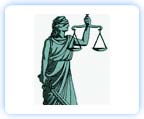
1. ON HUMAN RIGHTS TO HEALTH:
Two victims of passive smoking filed a Writ Petition in the High Court praying for a declaration that smoking in public places be declared illegal, unconstitutional and violative of Article 21 of the Constitution of India, besides constituting an offence of'public nuisance' as defined under section 268 of the Indian Penal Code (IPC). Allowing the writ after a marathon hearing, the Court passed the following: | 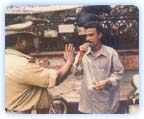 Narayana Kurup, J. For the purpose of the present controversy, suffice it to say, that a person is entitled to protection of law from being exposed to hazards of passive smoking. Under the common law a person whose right of easement, property or health is adversely affected by any act or omission of a third person in the neighborhood or at a far off place is entitled to seek an injunction and also claim damages, but the constitutional rights stand on a higher pedestal than the legal rights conferred by law, be it the municipal law or the common law. Such a danger as depicted in the earlier paragraphs of this judgment is bound to affect lakhs of people who may suffer from it unknowingly because of lack of awareness, information and education and also because such sufferance is silent and fatal and most of the people who are exposed to the lethal smoke do not know that they are in fact facing any risk or are likely to suffer by such risk. Because of lapses on the part of the authorities concerned in creating awareness of the dangers of passive smoking innocent people are unwillingly made to inhale noxious Environmental Tobacco Smoke (ETS) and consequently become victims of various deadly diseases. It is, therefore, time that the authorities should wake up before the matter slips out of their hands since health of large number of people is at stake. Maintenance of health and environment fall within the purview of Article 21 of the Constitution of India as it adversely affects the life of the citizens by slow and insidious poisoning, thereby reducing the very life span itself. Exposing unsuspecting individuals to Environmental Tobacco Smoke (ETS) with ominous consequences amounts to taking away their life, not by execution of death sentence, but by a slow and gradual process by robbing them of all their qualities and graces, a process which is much more cruel than sending a man to gallows......Smokers dig not only their own graves prematurely but also pose a serious threat to the lives of lakhs of innocent nonsmokers who get themselves exposed to ETS thereby violating their right to life guaranteed under Art. 21 of the Constitution of India. A healthy body is the very foundation for all human activities. In a welfare State it is the obligation of the State to ensure the creation and the sustaining of conditions congenial to good health. Narayana Kurup, J. For the purpose of the present controversy, suffice it to say, that a person is entitled to protection of law from being exposed to hazards of passive smoking. Under the common law a person whose right of easement, property or health is adversely affected by any act or omission of a third person in the neighborhood or at a far off place is entitled to seek an injunction and also claim damages, but the constitutional rights stand on a higher pedestal than the legal rights conferred by law, be it the municipal law or the common law. Such a danger as depicted in the earlier paragraphs of this judgment is bound to affect lakhs of people who may suffer from it unknowingly because of lack of awareness, information and education and also because such sufferance is silent and fatal and most of the people who are exposed to the lethal smoke do not know that they are in fact facing any risk or are likely to suffer by such risk. Because of lapses on the part of the authorities concerned in creating awareness of the dangers of passive smoking innocent people are unwillingly made to inhale noxious Environmental Tobacco Smoke (ETS) and consequently become victims of various deadly diseases. It is, therefore, time that the authorities should wake up before the matter slips out of their hands since health of large number of people is at stake. Maintenance of health and environment fall within the purview of Article 21 of the Constitution of India as it adversely affects the life of the citizens by slow and insidious poisoning, thereby reducing the very life span itself. Exposing unsuspecting individuals to Environmental Tobacco Smoke (ETS) with ominous consequences amounts to taking away their life, not by execution of death sentence, but by a slow and gradual process by robbing them of all their qualities and graces, a process which is much more cruel than sending a man to gallows......Smokers dig not only their own graves prematurely but also pose a serious threat to the lives of lakhs of innocent nonsmokers who get themselves exposed to ETS thereby violating their right to life guaranteed under Art. 21 of the Constitution of India. A healthy body is the very foundation for all human activities. In a welfare State it is the obligation of the State to ensure the creation and the sustaining of conditions congenial to good health. | 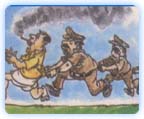 In the result, we declare and hold as follows: Public smoking of tobacco in any form whether in the form of cigarettes, cigars, beedies or otherwise is illegal, unconstitutional and violative of Art. 21 of the Constitution of India. Ramakrishnan & another v. State of Kerala & 51 others: 1999 (2) KIT 725 Coram: AR. Lakshmanan Ag. C.J & K. Narayana Kurup, J. In the result, we declare and hold as follows: Public smoking of tobacco in any form whether in the form of cigarettes, cigars, beedies or otherwise is illegal, unconstitutional and violative of Art. 21 of the Constitution of India. Ramakrishnan & another v. State of Kerala & 51 others: 1999 (2) KIT 725 Coram: AR. Lakshmanan Ag. C.J & K. Narayana Kurup, J. | 
2. ON THE LIMITS OF POWERS OF THE STATE ELECTION COMMISSION: In a batch of Writ Petitions challenging the de-novo de-limitation of wards in various Grama Panchayats in the State by the State Election Commission in the purported exercise of his power under section lOAof the Kerala Panchayat Raj Act, upsetting the de-limitation of wards ordered by the District Collectors, it was ruled as follows: K. Narayana Kurup, J. The bar created under Art. 243(o)(a) of the Constitution will not be attracted in a case where the action of the Election Commission is found to affect the very purity and probity of elections cutting at the very root of the democratic process in gross violation of public law rights. In such a situation, a petition under Art. 226 of the Constitution will be certainly maintainable especially before the election process is set in motion. We feel that in a situation like the present one absence of judicial review will create a constitutional despot beyond the pale of accountability; a 'Frankenstein monster' who may manipulate the System into elected despotism. There cannot be any dispute that the power conferred upon the Election Commission under the Constitution and the Act is very wide and do not contain any limitation. But the said power being a constitutional and public law power is amenable to judicial review on certain limited grounds and the narrow area in which the exercise of power by the Election Commission could be subjected to judicial review include the grounds where the decision is perverse or mala fide or based on wholly extraneous and irrelevant grounds and is therefore no decision at all. Of course, the power exercised by the Election Commission under S. 10A is indeed a very drastic power and the order passed by the Election Commission under the said provision is made final and conclusive and cannot be assailed on any ground. But this immunity from attack cannot apply where the challenge is not that the satisfaction is improper or unjustified, but that there is no satisfaction at all. In such a case it is not the satisfaction arrived at by the Election Commission which is challenged but the existence of the satisfaction itself. (See in this connection S.R. Bommai v. Union of India ((1994) 3 SCC I). We may wind up the discussion on this aspect by observing that the power vested in the High Courts to exercise judicial superintendence over the decisions of all Courts, Tribunals and public bodies exercising public law powers within their respective jurisdictions is also part of the basic structure of the Constitution. This is because a situation where the High Courts are divested of all other judicial functions apart from that of Constitutional interpretation, is equally to be avoided. The powers of judicial review is a basic structure of the Constitution (cf). | 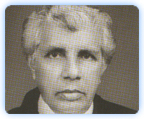 (See L. Chandra Kumar v. Union of India (AIR 1997 SC1125). Therefore, we have no hesitation in repelling the contention of the respondents that the jurisdiction of the High Court is excluded by virtue of the bar created under Art. 243 (o) (a) of the Constitution of India and to hold that the power of judicial review being a basic structure of the Constitution is very much available to see that the Election Commission has acted within the contours of the Constitution and the laws......Under our constitutional set up nobody is above law. However wide and unlimited the power of review be, it cannot run riot; for no legal power can run unruly like John Gilpin on the horse but must keep sensibly to a steady course. All public power including constitutional power shall never be exercisable arbitrarily or malafide and, ordinarily, guidelines for fair and equal execution are guarantors of the valid play of power. We take it that these axioms are valid in our constitutional set up. Kunhabdulla v. State Kerala 2000 (3) KLT 45 Coram: K. Narayana Kurup & Mohamed Shafi, J.J (See L. Chandra Kumar v. Union of India (AIR 1997 SC1125). Therefore, we have no hesitation in repelling the contention of the respondents that the jurisdiction of the High Court is excluded by virtue of the bar created under Art. 243 (o) (a) of the Constitution of India and to hold that the power of judicial review being a basic structure of the Constitution is very much available to see that the Election Commission has acted within the contours of the Constitution and the laws......Under our constitutional set up nobody is above law. However wide and unlimited the power of review be, it cannot run riot; for no legal power can run unruly like John Gilpin on the horse but must keep sensibly to a steady course. All public power including constitutional power shall never be exercisable arbitrarily or malafide and, ordinarily, guidelines for fair and equal execution are guarantors of the valid play of power. We take it that these axioms are valid in our constitutional set up. Kunhabdulla v. State Kerala 2000 (3) KLT 45 Coram: K. Narayana Kurup & Mohamed Shafi, J.J | 
3. ON CRIME , JUDICIARY AND PUBLIC ACCOUNTABILITY: The accused, notoriously known as 'Ripper' Chacko was tried for the offence of murder of an entire family of five in a brutal manner for gain. The Sessions Court found the accused guilty of the offence of murder and convicted and sentenced him to undergo imprisonment for life. There were two appeals to the High Court: one by the State to enhance the sentence to one of death and another by the accused for reversing the order of conviction and for acquitting him. Allowing the State appeal and dismissing the appeal filed by the accused it was held as follows: K. Narayana Kurup, J. Taking note of the entire scenario presented before us, we are of the opinion that the accused is a potential danger and menace to the society. Considering the number of persons murdered, age and infirmity of the victims, their vulnerability and helplessness coupled with the diabolic motive, the acts of perversion on the person of one of the victims, we are of opinion that the accused deserves the maximum penalty prescribed by law. We hasten to add that the brutal manner in which the accused wiped out the entire family for monetary gain is revolting to our judicial conscience. If in spite thereof, we fail to enhance the sentence from life imprisonment to death we will be exposing ourselves to the charge that we are yielding to spasmodic sentiments, unregulated benevolence and misplaced sympathy. It will be a mockery of justice to permit the accused to escape the extreme penalty of law when faced with such evidence and such cruel acts. To give the lesser punishment for the accused would be to render the justicing system of this country suspect. The common man will lose faith in courts. In such cases, he understands and appreciates the deterrence more than the reformative jargon. (Vide Khalid, J. in Mahesh v. State of 'Madhya Pradesh ((1987) 3 S.C.C 80). Failure to impose death sentence in a case of this nature which we consider as rarest of the rare, will bring to naught the sentence of death provided by Section 302 IPC. The only punishment which the accused deserves for having committed the reprehensible and gruesome murder of the entire family consisting to father, mother, two daughters and one son for gain is nothing but death as a measure of social necessity and also as a means of deterring other potential offenders. In the result, the appeal filed by the accused as Crl. Appeal No. 105 of 1998 is dismissed and the appeal tiled by the State as Crl. | 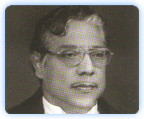 Appeal No. 642 of 1998 is allowed. Coram: K. Narayana Kurup & T.M. Hassaan Pillai, J.J. Appeal No. 642 of 1998 is allowed. Coram: K. Narayana Kurup & T.M. Hassaan Pillai, J.J.
Editor's Note: Citing the decision of the Supreme Court in Shivaji's case AIR 1973 SC 2622, the judge responded to the reversal of conviction and sentence of the accused by the Apex Court as follows: The perspective in which evidence should be appreciated was indicated by the Supreme Court in Shivaji's case noted supra, wherein it has been held that the judiciary has a public accountability. The cherished principle of proof beyond reasonable doubt should not be stretched morbidly to embrace every hunch, hesitancy and a degree of doubt. Our jurisprudential enthusiasm for presumed innocence must be moderated by the pragmatic need to make a criminal justice potent and realistic. | 
4. ON JUDICIAL PROPRIETY: K. Narayana Kurup, J. While there are no formal rules to regulate the conduct of Judges of the Supreme Court and the High Courts, there exists an unwritten Code on the subject. This Code is based on a long line of traditions bearing on the upright, righteous, and uncontroversial behaviour of the members of the Judiciary. It is expected of Judges to scrupulously confirm to the time-honoured conventions on the subject. Their behaviour has to be informed by a sense of dignity of the Judiciary as a whole so as to sustain the deep respect of the general public. They are expected generally to conduct themselves in such a way as not to give rise to any legitimate doubt about their Judicial detachment. It may also be noted that Judicial propriety does not end in the court room. In private as also in post-retirement life, the Judges have to conduct themselves in conformity with certain time-honoured standards of a restraining nature. It is not as if the umbilical cord of propriety, decorum and restraint are completely severed the moment one bids farewell to the Bench giving unbridled liberty to act in whatever manner one fancies. Therefore, the importance to continue to maintain moderation, reserve and sobriety even after one has retired from the Bench. Nixon v. Union of India: 1998 (2) KIT 712 | 
5. ON SPEEDY TRIAL: K. Narayana Kurup, J. By now, it is settled law that a person accused of a criminal offence shall be guaranteed a speedy trial. It is implicit in the right to life guaranteed under Art. 21 of the Constitution of India. Logically, therefore, if a speedy trial cannot be ensured, the liberty of the accused cannot be curtailed by indefinite prolongation of the trial. Whether an accused who is facing a trial is in custody or on bail, are matters of no moment in this regard because the liberty of the accused is still curtailed completely or partially and this can only be done within the framework of the law. It is in this background that the grievance projected by the petitioners against whom proceedings are pending since 1983 have to be viewed. By speedy trial one presupposes that it will be a trial which will be completed within a reasonable period of time and that every effort will be made to avoid delay. Under these circumstances, where a proceeding has not been completed though 14 years have elapsed, it cannot by any stretch of imagination, be argued that the spirit of the rights guaranteed under Art. 21 of the Constitution has not been infringed upon. There is another aspect to proceedings of this type, which a court of law requires to take very serious cognizance of. Not only is the prosecution seriously handicapped due to the passage of time because inevitably some or any of the witnesses may not be available and there is a possibility of the record getting lost or misplaced, but more importantly where the burden of establishing the charges vested heavily on the oral evidence of the prosecution witnesses, it would be rather far-fetched to expect that witnesses deposing to facts and circumstances that are more than one decade old would be able to do so with any serious degree of exactness. If the evidence that is to be presented is inevitably uncertain and thereby tainted, it would be a complete waste of judicial time going through such an empty exercise on the basis of which the prosecution can never hope to succeed. A more serious aspect which needs to be borne in mind in such situations is that a criminal prosecution is a very serious matter because lapses on the part of the defense would inevitably result in penal consequences to the accused which would entail a heavy jail sentence and or fine. Under these circumstances, the law presupposes that the accused shall also be afforded a fair opportunity to defend himself. Taking therefore, an overall picture of the entire circumstances including the nature of the alleged offences, its impact upon the society, the time at which it is said to have been committed when the society was more tolerant in such matters, the number of years the accused have been spending in the court for defending themselves and the number of years it is likely to take if the trial is to go on, the abnormal expenses incurred by the accused as well as the State in the prosecution of these cases, it appears that this is a fit case for quashing the criminal prosecution as a violation of the petitioners' right under Art. 21 of the Constitution. Dr. Louis V. Pulickal v. State of Kerala: 1997 (2)KLT233 | 
6. CAN A SURROGATE REPRESENT THE CHIEF MINISTER IN HIS CONSTITUENCY:
K. Narayana Kurup, J. No doubt, it is true that the Chief Minister cannot abdicate his essential constitutional functions to his chosen delegate(s). Perforce, such functions will have to be discharged by him personally and not through his surrogates. Going by Ext. PI, what has been done is that the 2nd respondent has been appointed as the representative of the Chief Minister in Thalasseiy constituency. For the reason already stated, I do not think that there is anything illegal in it especially when it is remembered that the Chief Minister cannot personally attend to all the matters in his constituency. Certainly this calls for somebody to act as his nominee. It has to be remembered that the Chief Minister and the Council of Ministers hold office during the pleasure of the Governor. Therefore, it may not be a proper exercise of jurisdiction for this Court to grant the relief as prayed. I do not find any abdication of essential constitutional function on the part of the first respondent so as to catalyse this Court to exercise its extra-ordinary discretionary jurisdiction under Art. 226 of the Constitution. It is an integral part of the functioning of the high constitutional office like that of the Chief Minister to delegate certain functions to others since it may be practically impossible to bestow his personal attention on each and every matter in his constituency. One will have to reconcile with such delegation while holding high public office. Certainly, some amount of play in the joints will have to be conceded to the constitutional functionary while discharging his functions. His conduct in that regard is therefore not liable to be called in question before this Court. It might be a matter for the Legislature and the electorate and certainly not for the courts to give a direction in that behalf. Asafali v. E.K. Nayanar 1998 (2) KLT 623 | 
7. Can C.B.I, enquiry be ordered when the State Government has not consented to the same
under section 6 of the Delhi Special Police Establishment Act 1946?: The subject matter of the Writ Petition is a sex scandal in which a lady by name Sreedevi, owner of an ice cream parlour is alleged to have procured girls for important politicians, an ex-minister, bureaucrats including IAS and IPS officers etc. The prayer in the Writ Petition is for the issuance of a writ of mandamus directing the State of Kerala and the D.G.P to entrust the investigation of the case to the C.B.I, and for other reliefs. Dismissing the Writ Petition it was ruled as follows: K. Narayana Kurup, J. Sex and sensation of the crime and the high profile of the offenders with the attendant media glare that accompanies it may not be the proper yardstick to decide the question as to whether in a given case an investigation has to be ordered by the C.B.I. It is the nature and severely of the offence with the ramifications and fall-out it may produce that matters in ordering investigation by an "external agency" and not the personality of the individual(s) involved or its moral aspect. It is important to note that the investigation is at present in the charge of an Officer of the rank of lnspector General of Police. This should inspire confidence in fair investigation. No concrete fact suggesting any attempt to exclude any influential person or persons is stated in the petition. Mere apprehension or abstract unsubstantiated fears not based on facts are not sufficient to invoke the extraordinary jurisdiction under Art. 226 of the Constitution. The alleged interference with the investigation by "influential persons ", "police inaction ", "lack of fairness " are all too broad and sweeping a statement to merit any cognizance by this Court. The offences or classes of offences to be investigated by the officers under this Act have been stated in S.3 of the Act. Only those offences specified by the Central Government by a notification in the official Gazette can be investigated. No doubt, S. 6 of the Act does not apply where the court directs the C.B.I to investigate. The court can direct the C.B.I, to investigate a case only where it is satisfied that the investigation is not proceeding in the right manner. The Act confers on the Central Government powers to have investigations made, for the purposes permitted by the Act and these powers are not coupled with any duty towards any persons. Hence, no mandamus can be issued directing the Government to exercise its powers or discretion in a particular manner. Court can give directions to the police if they failed in the discharge of statutory duties but that is not a matter of right vested in any party. Anweshi WC. Centre v State of Kerala: 1998 (2) KLT 454 | 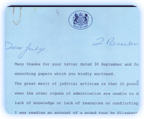 
8. ON RIGHT TO TRAVEL: K. Narayana Kurup, J. The Judge considers transportation as the lifeline of the people, denial of which results in infraction of the constitutional right to life guaranteed under Art. 21 of the Constitution of India. That is the reason why the Judge un-hesitatingly ordered survey by the Fourth Estate in Trivandrum city to assess the performance of the State owned Road Transport Corporation(K.S.R.TC). The survey revealed that vast majority of the commuters were thoroughly dissatisfied with the performance of the K.S.R.T.C and they wanted the private operators to come in. Immediately upon receipt of the survey report, the Judge ordered the government to issue permits to 200 private operators to ply their buses in the Trivandrum city nationalised route. Though this order was stayed by the Division Bench, the government realizing the gravity of the problem did not waste any time and issued permits to 200 private operators. |  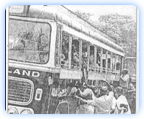 It was indeed a glowing tribute to the bold initiative of the Judge that none other than British Law Lord Templeman while complimenting the Indian judiciary for its decisive interventions for public causes made specific mention about the Trivandrum transportation case. Lord Templeman wrote "Justice Kurup's successful intervention in the transportation service shows how necessary and beneficial judicial action can be ". By allowing private operators to ply buses to ease the commuting difficulties of the people in Thiruvananthapuram, Justice Kurup was actually wrecking the monopoly of the State owned Kerala State Road Transport Corporation which was in the dock for years together for its inefficiency. The widely commended part of Justice Kurup's sensible intervention in the issue was his unconventional but bold step of ordering surveys by leading newspapers on the issue before reaching a decision. Perhaps, it was for the first time in recent years The Fourth Estate was taken into confidence by the Courts for judging a most pressing public issue. The Indian Express, commenting on the issue in a special article wrote, "Justice Kurup perhaps received more bouquets from people than brickbats from the ruling class for passing an order which sought to end the KSRTCs inefficient monopoly over Thiruvananthapuram city routes ". The media all over the State widely acclaimed Justice Kurup's decision especially his decision to involve the media before arriving at the judgment. In fact, the usual practice was that of appointing a commission of advocate to ascertain the facts. But Justice Kurup has justified his action considering the wider issue of public interest involved. On this widely acclaimed judgment Justice Kurup said "I have always felt that any law or its interpretation is meaningless unless if fulfils the legitimate needs of the people ". In re Trivandrum Transportation case (1996) | 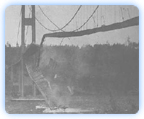
9. ON TORTIOUS LIABILITY OF THE GOVERNMENT: The Public Works Department of the Government of Kerala constructed a bridge which collapsed 8 years after it was commissioned resulting in the death of the husband of the first plaintiff. The suit for damages filed by the wife of the deceased was decreed against the fourth defendant Panchayat alone and exonerating defendants 1 to 3 (officers of the PWD) from any liability. On appeal by the Panchayat it was held dismissing the plea of 'Act of God' set up by the Government that the officers of the P. W.D. are equally responsible for the mishap K. Narayana Kurup, J. It has also to be noted that mere ravages of weather or monsoon may not by itself amount to "Act of God " unless the fury is of such a degree or dimension that no human foresight can provide against and of which human prudence is not bound to recognize the possibility. See 1986 KLT1192 = AIR 1987 Ker. 62FB General Traders Ltd. & anr. V. Pierce Leslie (India) Ltd. and others. That is not the case here. Apart from the heavy rains that lashed the district there is nothing to indicate that a tornado or cyclone developed in the area causing extensive and devastating damage leaving a trail of destruction on a large scale. In a state like Kerala fury of monsoon is a common phenomenon and defense of 'Act of God' based on such a phenomenon, if permitted to be raised casually will lead to catastrophic consequences. No road or bridge in the state will be safe for public use as the perpetrators of negligence can get away pleading 'Act of God' as a convenient plea. That apart, the collapse of the bridge within 8 years of its construction invites the automatic application of the doctrine of 'res-ipsa loquitor', making all defendants equally liable in damages to the plaintiff. In the result, the judgment and decree of the trial court were modified and a decree in favour of the plaintiff's against all the defendants was given. The liability of defendants 1 to 3 and the 4"' defendant (Appellant herein) was fixed at the rate of 50:50. The decree of the trial court was confirmed in all other respects, subject to the aforesaid modification. The parties were directed to suffer their respective costs. Pullur Periya Panchayat v. Karthiyayini 1997 (1) KLT 144 Coram: K.G Balakrishnan & K. Narayana Kurup J.J | 
10. ON ENVIROMENT: In a Writ Petition challenging an order permitting the establishment of a cement godown in a shopping complex, the Judge ruled as follows: K. Narayana Kurup, J. A square peg in a round hole - cement godown in a shopping complex and that too in the proximity of a residential area. Cement though a boon to the builder is a bane to the person who inhales it. Is it not incongruous and glaringly odd to permit a cement depot to run in a residential area, asks the judge ? And that is the question that arises in this Writ Petition. The Mother Earth is dangerously ill with pollution, right from the bottom of the seas to the limitless outer space. Even the very existence of the globe is at stake thanks to the ever increasing flow of chlorofluro carbons (CFCS) which has destroyed the protective ozone layer of the earth thereby increasing the risk of ultra-violet radiation and global warming. Dust of many a political storm including the cold war between superpower blocs has settled down, but not the ever increasing dust of pollution, whether it be pollution on the seas or on the land or pollution in space or whether it be sound pollution or nuclear pollution posing a perpetual threat to the life and well being of mankind. Though the first respondent may be helpless to tackle pollution in its entirety at various levels as noticed above, nevertheless he can certainly make his squirrel's mite contribution to minimise it at least within the domain of his little kingdom, observed the judge In the result the Writ Petition was allowed and the impugned orders granting permit to respondents 4, 5 and 6 to carry on the business of storing, loading and unloading of cement in the premises in question were quashed. Antony v. Commissioner, Corporation of Cochin. 1994 (1) KLT169 | 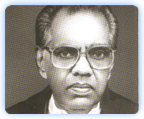
 | 11. ANIMALS HAVE THE RIGHT TO DIGNITY:
In yet another landmark judgment that can have a major impact on show business and the nation's attitude towards animals, the Judge presiding over the Division Bench (Coram Narayana Kurup & Shankara Narayanan JJ ) ruled that animals have inherent rights of dignified existence akin to the basic rights of humans. The Court upheld the Government order prohibiting the training of and display by five species of animals in circuses (lion, tiger, bear, panther and monkey) throughout in India. According to "Frontline" issue dated 18.08.2000, the judgment while upholding a law against the training of and display by animals, seeks to correct a constitutional anachronism and has "pushed Indian jurisprudence to a new level." In urging basic rights for animals, Justice Kurup has shown once more that the court is prepared "to go beyond the letter of the law to reinterpret, even extend-it, in the light of evolving public consciousness."
| 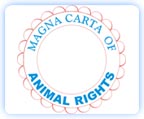

| K. Narayana Kurup, J. We hold that circus animals are being forced to perform unnatural tricks, are housed in cramped cages, subjected to fear, hunger, pain, not to mention the undignified way of life they have to live with no respite and the impugned notification has been issued in conformity with the changing scenario, values of human life, philosophy of the Constitution, prevailing conditions and the surrounding circumstances to prevent the infliction of unnecessary pain or suffering on animals. Though not Homosapiens, they are also beings entitled to dignified existence and humane treatment sans cruelty and torture. In many respects, they comport better than humans, they kill to eat and eat to live and not live to eat as some of us do, they do not practice deception, fraud, or falsehood and malpractices as humans do, they care for their little ones expecting nothing in return, they do not proliferate as we do depleting the already scarce resources of the earth, for they practice sex restraint by seasonal mating, nor do they inhale the lethal smoke of tobacco polluting the atmosphere and inflicting harm on fellow beings. All animals except the very lowest exhibit some degree of intelligent behaviour, ranging from learned responses to complex reasoning. Many believe that the lives of humans and animals are equally valuable and that their interests should count equally. Their contribution to the health of humans is invaluable, once it is remembered that nearly every advance in health care and combating human diseases have been based on animal research. Animals also provide models for the study of human diseases. New drugs are tested on animals to help determine their potential for causing cancer or other disease or for harming embryos and fetuses in the womb. Therefore, it is not only our fundamental duty to show compassion to our animal friends, but also to recognise and protect their rights. In this context, we may ask why not our educational institutions offer a course on "Animal Rights Law" with an emphasis on basic rights as has been done by the Harvard Law School recently? If humans are entitled to fundamental rights, why not animals? In our considered opinion, legal rights shall not be the exclusive preserve of the humans which has to be extended beyond people thereby 'dismantling the thick legal wall with humans all on one side and all non-human animals on the other side' vide Rattling the Cage: Steven M. Wise. While the law currently protects wildlife and endangered species from extinction, animals are denied rights, an anachronism which must necessarily change. Thus, on the whole, in the light of the foregoing discussion, we are satisfied that the impugned notification which is under challenge in this batch of writ petitions does not suffer from any of the infirmities as alleged and the same has only to be upheld. Accordingly, we uphold the notification dated 14-10-1998 and dismiss these writ petitions, (para 14 of the Judgment) Jumbo Circus Vs. Union of India 2000(2) KLT 625, Coram: K. Narayana Kurup and K.V Sankaranarayanan, J.J.
TAILPIECE: 'In these days of judicial obfuscation where, it is good to hunt with the hounds and race with the hares, so that both parties feel they have won not only a battle but the war, the Kurup -judgement that gave tongue to the silent millions in the jungles in India, stands out like a beacon light. Man the marauder has compelled Gibbon in his "Decline and fall of the Roman Empire", to epigrammatize man's fall thus: "Corruption is the infallible symptom of Liberty", We were liberated and then we became corrupt and commercial. What hope is there for mere animals, except through the Kurup-doctrine quoted in paragraph 14 of the judgement'. M.A. Sadnand, Advocate: Uncle Tom's Cabin 2001 (2) CTC 92 (Journal Section) | 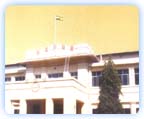
12. OFFICERS AND SERVANTS OF THE HIGH COURT DO NOT HOLD POSTS UNDER THE STATE: K. N ARAYAN A KURUP, J. The position which the officers and servants of the High Court occupy under our constitutional set up is a unique one. No doubt, they hold posts in connection with the affairs of the State and belong to civil services of the State, but nevertheless they do not hold posts under the State nor do they belong to any service under the State within the meaning of that expression under Art. 16(4) of the Constitution. In this connection, it has to be remembered that as far as the officers and servants of the High Courts are concerned, the Chief Justice is the appointing authority and in respect of them, the administrative control is vested in the Chief Justice who, under the Constitution, has the power of appointment and removal and of making rules prescribing the conditions of their service. The obvious intention of the framers of the Constitution in enacting Art. 229 is that in the matter of appointment of officers and servants ofHigh Court, it is the Chief Justice who is to be the supreme authority and there can be no interference by any other authority with the powers of the Chief Justice in the matter of appointment of officers and servants of the High Court and prescribing their conditions of service except to the limited extent provided in the Article itself. This was essentially intended to ensure the independence of the High Courts which is fully shown by charging the administrative expenses of a High Court including all salaries, allowances and pension payable to the officers and servants of High Court at the same level as the salaries and allowances of the judges of the High court. Nor can the amount of any expenditure so charged be varied even by the legislature. Officers and servants of the High Court are not holders of any service under the State within the meaning of Art. 16(4) of the Constitution. Vakkom N. Vijayan v. Chief Justice 1994 (1) KLT 280 (F.B.) | 
13. WHAT IS PHILANTHROPY ? In C.I.T v. Pulickal Medical Foundation (P) Ltd. 210 ITR 299, the Judge made a detailed analysis of the provision relating to tax exemption claimed by philanthropic institutions like hospitals. His exposition of the concept of'philanthropy' in the context of'charity' was perhaps a landmark observation later ratified by the Apex Court. Justice Kurup while explaining the concept of'philanthropy' observed, "given the general principles of interpretation of statutes, the legislature must be presumed to have used that expression with an altogether different intention qua charity, as otherwise there was no need to bring about an amendment incorporating the word 'philanthropy' in Sec. 10 (22A) of the Income Tax Act"......No doubt, the basic concept of philanthropy has changed from that of caring for the physical needs of the destitute to meet the physical as well as social and mental well-being which is what health is, as defined by the World Health Organization- of one's fellow being so that the emphasis is now on securing a better, happier or healthier world for all; and the focus has shifted from the relief of immediate want to long-term planning that will prevent or mitigate misery and hardship (see in this connection International Encyclopedia of the Social Sciences under the heading "Philanthropy "). According to him, there may be purposes which might be philanthropic and at the same time not charitable, indicating goodwill to rich men to the exclusion of poor men. Such purposes, though not charitable, would nevertheless be philanthropic indicating goodwill towards mankind or a great portion of them. On an analogy, a trust may be charitable even though it is not confined to the poor, but doubts the charitable nature of a trust which excludes the poor. cf. In re Macduff: Macduff v. Macduff (1896)2 Ch 451 (CA). Coram K. John Mathew & K. Narayana Kurup JJ. | 
14. ON THE INTERNAL 'IMMORALITY OF THE LAW' The deceased was traveling from Dadar to Madras on 22-9-1990 in the Dadar Express. After the train left Ranigunta Railway Station the passenger went to the toilet where a sharp rusted iron plate protruding from the toilet wall struck him, as a result of which he sustained bleeding injury on the neck and later succumbed to the same, giving rise to claim petition by the wife of the deceased before the Railway Claims Tribunal, Madras. The Tribunal having rejected the claim on the ground that the incident in question is neither an 'accident' ('accident' means accident to the train) nor an 'untoward incident' (accidental falling of any passenger from a train carrying passengers) as defined under the Railways Act 1989, the aggrieved party moved the High Court in appeal which was allowed against which the Letters Patent Appeal was preferred by the Railway to the Division Bench.
Dismissing the appeal it was held as follows: K. Narayana Kurup, J In this connection, we have to remind ourselves that this court is not only a Court of law but also a court of equitable jurisdiction, which has to be exercised in such a way as to mete out to justice to the aggrieved party viz., the respondent/legal heirs of the deceased. While interpreting laws and administering justice, the Courts have to discharge their function humanely and with an element of mercy. No law, whether it be judge made or legislatively enacted, can be perfectly drafted as to leave no room for dispute. The law with which we are concerned, namely, the Railways Act, if literally interpreted, will certainly result in elbowing out the legal representatives of the deceased, causing untold misery, hardship and miscarriage of justice. Most of the world's injustices are inflicted not with the fists, but with the elbows. When we use our fists, we use them for a definite purpose, and we are answerable to others and to ourselves for that purpose. Our elbows, we may comfortably suppose, trace random pattern for which we are not responsible, even though our neighbour may be painfully aware that he is being systematically pushed from his seat. In the aforesaid metaphor, the neighbour is none other than the respondents herein whose interests are sacrified at the altar of justice by the internal immorality of the law with which we are concerned viz., the Railways Act, which denies them access to a speedier forum to settle their claim. This Court, strongly committed to the principles of justice, is not only concerned with the legislativefists, but with their elbows as well, (see in this connection "The Morality of Law " by Lon L. Fuller, secondIndian Reprint 2000, at page 159). The result, therefore, is that though the appellant (Railway) may be on a strong wicket from the legal point of view in the sense the incident in question is neither an "accident" not an "untoward incident" attracting the jurisdiction of the Claims Tribunal, having regard to the long lapse of time, namely, 11 years from the date of incident and the admitted negligent conduct of the administration in maintaining the coaches resulting in the death of the deceased, we uphold the claim for compensation (which in fairness was agreed to by the learned counsel for the appellant), namely the sum of Rs.2.00 lakhs already deposited by the appellant before this court with interest at 12% p.a. from the date of petition till the date of deposit. Since the amount is already in deposit, the respondents/Claimants will be at liberty to withdraw the same forthwith. Union of India v. Krishnammal 2001(3) CTC 324 Coram: K. Narayana Kurup & A. Ramamurthi, J.J | 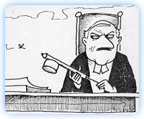
15. HC steps in to take on mosquitoes: K. NARAYANA KURUP, J. Our nation famed for its innovative and creative use of dung has now become producers of the dengue. The epidemic that recently took a heavy toll of precious lives in Surat which was soon followed by deaths caused by the dengue carrying mosquitoes of Delhi should serve as ominous portents of what is in store for us/Kochinites in Kerala. Kochi is no doubt famous for its backwaters and legoons - it is equally notorious for its nasty gutters and stagnant ponds which breeds mosquitoes in plenty. The mosquito is no respetor of persons and has been indiscriminate in striking the rich and the poor, the learned and the laity, the young and the old, the pretty and the ugly, alike. 2. Much could be done by a responsible local Authority (Corporation) by taking affirmative action on a time bound basis to mitigate the hardship of the people. However, there is no indication that any tangible action has been programmed to combate the mosquito menace by tackling it on a war footing. The official reaction is one of lethargy and in¬action and false assumption that they have only powers and no duties. Added to this is the saddening fact that the Corporation has financial crunch. But it must be remembered that a responsible local body constituted for the purpose of preserving public health cannot run away from its duty by pleading financial inability (vide Krishna Iyer, J. in Ratlam Municipality v. Vardhichand - A.I.R. 1980 SC 1622) In the above backdrop, this court is of the firm opinion that it should step in and find out ways and means to bale out the Corporation out of its present precarious position in order to protect the health of the citizens which has been declared by the Apex Court as a part of fundamental right to life and liberty of every person. By doing so, I am quite aware of the fact that I will be exposing myself to the charge that the court has assumed the role of a "garbage supervisor", but -the brunt of that cross is worth bearing, having regard to the ultimate benefit it may bring to the people. It is high time to remind the public authorities to shed their ego | 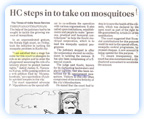 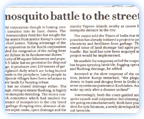
about court verdicts passed in public interest which must be accepted in the right spirit bearing in mind the paramount consideration of the health and well being of the people as imperatively implicit in the right to life guaranteed under Article 21 of the Constitution. 3. In the light of the aforesaid discussion, I am satisfied that a stage has come for this court to abnegate tee role sf an umpire and to enter the play ground assuming the role of a salutory player to protect human rights. Accordingly, I call upon the various institutions, establishments and organisations who are Impleaded as respondents in this original petition to come forward and te make generous, practical and humanist contributions to the "Mosquito Control Programme" of the High Court of Kerala by crossed cheque. Demand Draft, the proceeds of which will be utilised for spraying chemicals, purchase of pesticides, machines, etc. etc. in co-operation with the Corporation. Shri P.Vijaya Bhanu, Advocate of this court is appointed as the Special Officer who will co-ordinate the operation by keeping laison with the various authorities and institutions. Shri C.E.Unniktishnan and Shri Noble Mathew, Advocates will assist him. The cheques and Demand Drafts shall be drawn in |
|
|
|